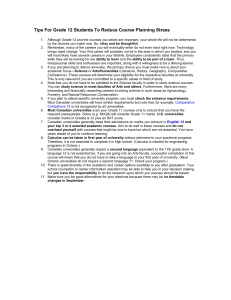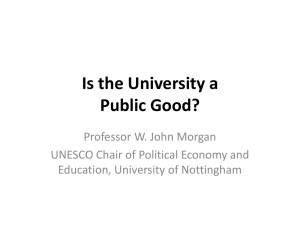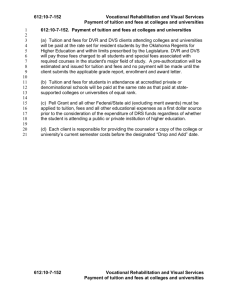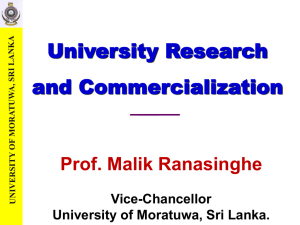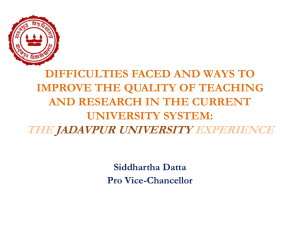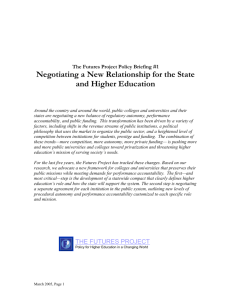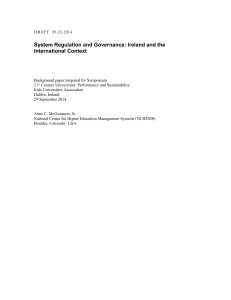HEWP: draft oral statement
advertisement
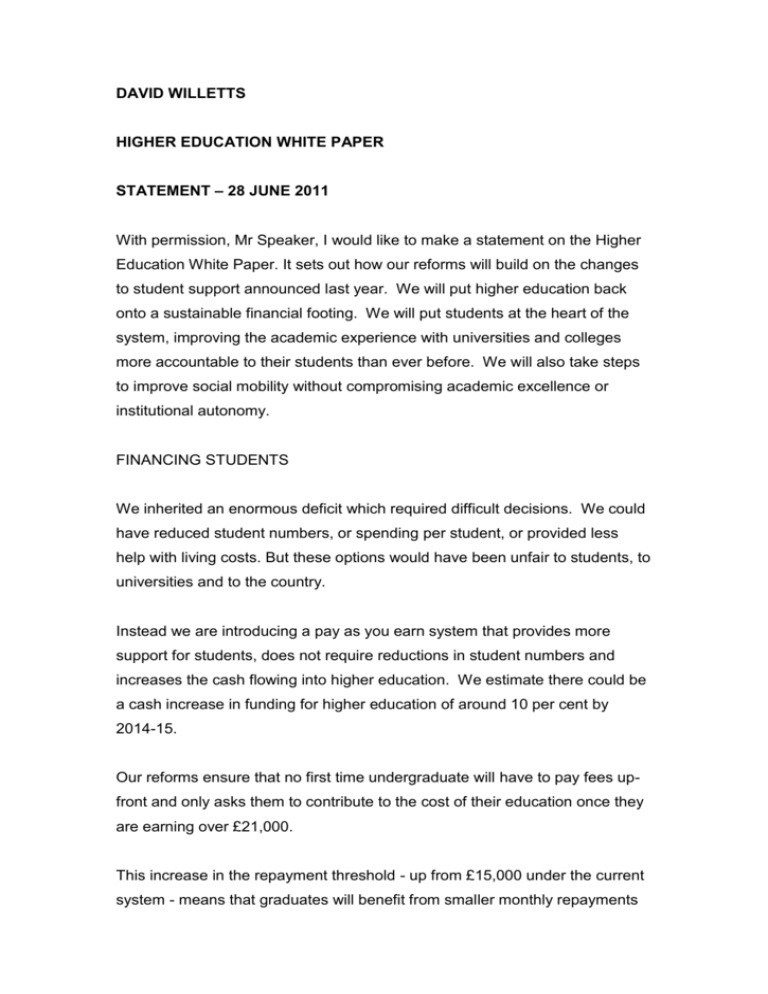
DAVID WILLETTS HIGHER EDUCATION WHITE PAPER STATEMENT – 28 JUNE 2011 With permission, Mr Speaker, I would like to make a statement on the Higher Education White Paper. It sets out how our reforms will build on the changes to student support announced last year. We will put higher education back onto a sustainable financial footing. We will put students at the heart of the system, improving the academic experience with universities and colleges more accountable to their students than ever before. We will also take steps to improve social mobility without compromising academic excellence or institutional autonomy. FINANCING STUDENTS We inherited an enormous deficit which required difficult decisions. We could have reduced student numbers, or spending per student, or provided less help with living costs. But these options would have been unfair to students, to universities and to the country. Instead we are introducing a pay as you earn system that provides more support for students, does not require reductions in student numbers and increases the cash flowing into higher education. We estimate there could be a cash increase in funding for higher education of around 10 per cent by 2014-15. Our reforms ensure that no first time undergraduate will have to pay fees upfront and only asks them to contribute to the cost of their education once they are earning over £21,000. This increase in the repayment threshold - up from £15,000 under the current system - means that graduates will benefit from smaller monthly repayments than under the current system. For example, someone earning £20,000 – the median starting salary for graduates – repays £38 a month under the system we inherited from the previous Government. In future they will pay nothing. At the moment a graduate earning £36,000 – the median salary for all graduates – pays £158 a month: in our scheme that falls to £113 a month. Our reforms also recognise that, for many people, higher education does not mean a full-time, residential degree. Some students want to work or take care of their family while studying. To support them, many part-time students and distance-learners will become entitled to loans to cover their full tuition costs for the first time. And I can announce today that my Rt Hon friend the Secretary of State for Health and I have agreed that, for undergraduate medical and dentistry students starting their course in autumn 2012, the NHS bursary will be increased in years 5 and 6 to cover the full costs of tuition. For graduate entrants starting in autumn 2012, access to student loans will be made available so that there are no additional up-front tuition costs. We will consider arrangements for subsequent years. More information is being placed in the libraries of both Houses. IMPROVING THE STUDENT EXPERIENCE These changes to higher education funding enable us to put financial power in the hands of learners. But to make that effective we need to liberalise the system of quotas we inherited from the previous Government so that more students can go to universities that offer a good quality, good value student experience. The White Paper therefore proposes unconstrained recruitment of the roughly 65,000 high achieving students, scoring the equivalent of AAB grades or above at A-Level. Quotas for these students will be abolished and funding will go to whichever university offers them a place they accept. In addition we will create a flexible margin of about 20,000 places to reward universities and colleges that combine good quality with value for money and with average tuition charge (after waivers) at or below £7,500 per year. This adds up to around 85,000 student places – that’s roughly 1 in 4 places for new entrants contestable between institutions in 2012/13. We aim to expand this further year after year. We will also extend the scope for employers and charities to offer sponsorship for extra places, provided they do not create a cost liability for Government and provided, of course, there is fair access for all applicants regardless of ability to pay and no sacrifice of academic standards. These reforms put students in the driving seat. Putting this power to best effect means not just liberalising the quotas regime. Prospective students also need to know far more about the academic experience on offer. We will therefore transform the information available to them about individual courses at individual institutions. Each institution will make available key items of information such as contact hours and job prospects. Information will also be available to outside bodies such as Which? to produce their own comparisons. It will lead universities to match their excellence in research with a high quality academic experience. We also want our universities to work with business to improve the job prospects of their graduates by providing the knowledge and skills employers value. The Sandwich course, giving students practical experience of work, declined under the last Labour Government. We want to reverse that. We have therefore asked Professor Sir Tim Wilson, who made the University of Hertfordshire one of our most business friendly universities, to review how we can make England the best place in the world for university-industry collaboration. We want our universities to work with business across their teaching and research activities to promote better teaching, employer sponsorship, innovation and enterprise. Student choice is more real if, as well as liberalising quotas and transforming information, there is greater diversity of institutions to choose from. We will therefore remove the barriers to more provision from the Open University, further education colleges and private providers. We will simplify the regime for obtaining degree-awarding powers. We will also review the artificial barriers to smaller higher education institutions taking the title “university”. FAIR ACCESS We want students from a wide range of backgrounds to benefit from these reforms. We are increasing maintenance grants and loans for nearly all students. We are introducing a National Scholarship Programme. And we will strengthen the Office for Fair Access to make sure institutions fulfil their outreach and retention obligations for people from disadvantaged groups. This will not be at the expense of institutional autonomy. The Director of Fair Access will continue to have a duty to protect academic freedom, including an institution’s right to decide whom to admit and on what basis. NEW REGULATORY FRAMEWORK In order for universities and academics to focus on educating their students, we will strip back the burden of excessive regulation and form-filling. We will explore whether it is possible to reduce costs associated with corporation tax returns. HMRC have today announced their consultation on the possibility of introducing a relief to remove some of the VAT barriers which currently deter institutions from sharing costs. We will reduce burdens from information collection. We will give power to students to trigger quality reviews where there are grounds for concern, yet cut back the burden of automatic review for high performing institutions. The Higher Education Funding Council for England will be the lead regulator, taking on a new role as consumer champion for students and promoter of a competitive system. CONCLUSION We are now inviting people to comment on our proposals as part of a broad consultation. Subject to parliamentary time, this will be followed by a higher education bill next year, to make the necessary legislative changes to deliver these reforms. This White Paper offers universities the prospect of more funding provided that they attract students. At the same time it saves money for the exchequer by asking graduates to pay back more as their earnings increase. Our universities already transform people’s life chances: we expect them to do even more. We will protect their autonomy and reduce the regulatory burdens they face. Above all our proposals benefit students by driving universities to focus on the student experience. They will have real choice – with better information and a wider range of institutions to choose from. I commend this White Paper to the House.



